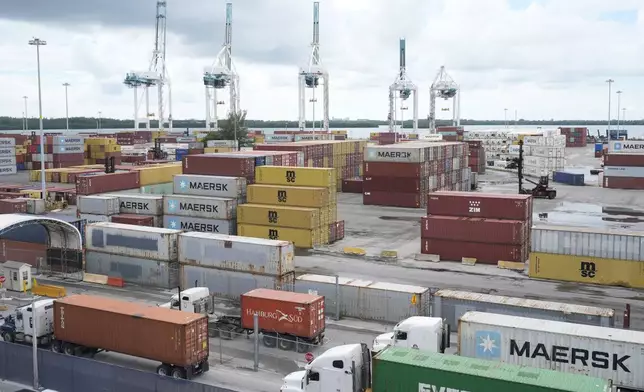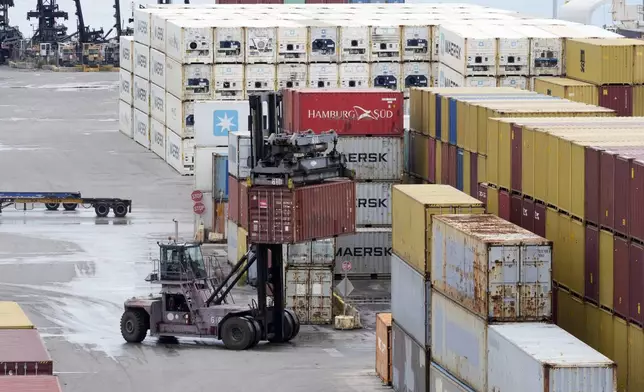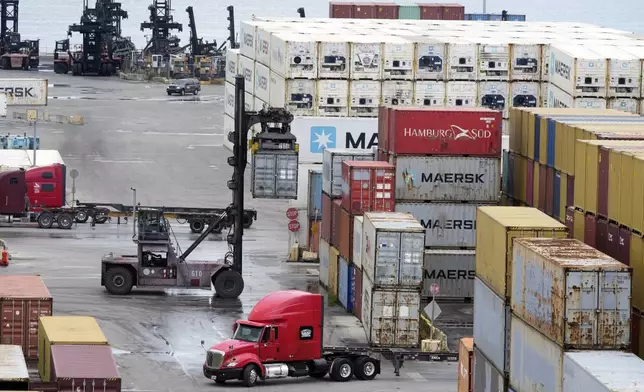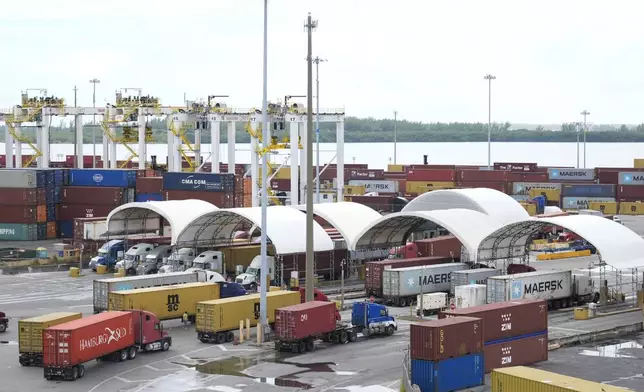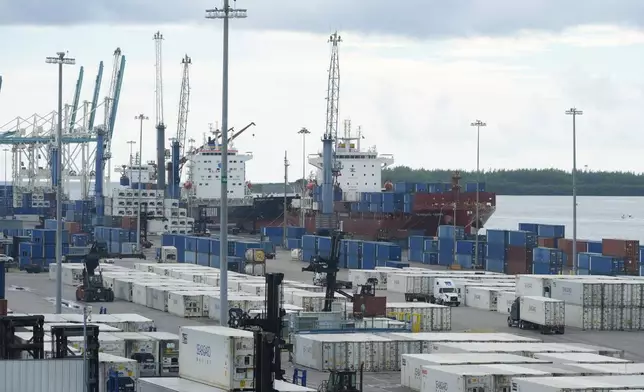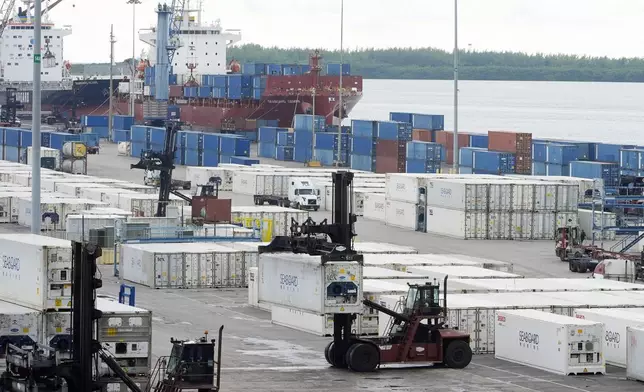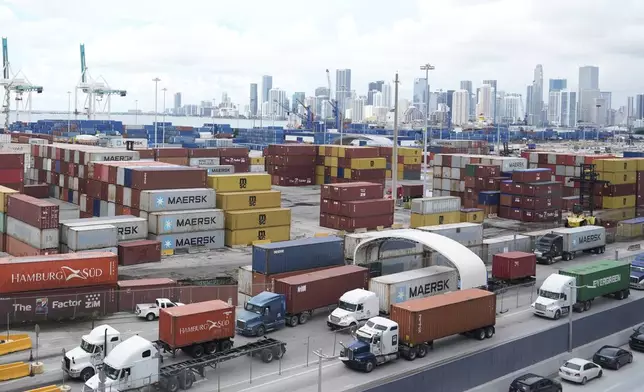DETROIT (AP) — Some 45,000 dockworkers at East and Gulf coast ports are returning to work after their union reached a deal to suspend a strike that could have caused shortages and higher prices if it had dragged on.
The International Longshoremen’s Association is suspending its three-day strike until Jan. 15 to provide time to negotiate a new contract. The union and the U.S. Maritime Alliance, which represents ports and shipping companies, said in a joint statement that they have reached a tentative agreement on wages.
A person briefed on the agreement said the ports sweetened their wage offer from about 50% over six years to 62%. The person didn’t want to be identified because the agreement is tentative. Any wage increase would have to be approved by union members as part of the ratification of a final contract.
Talks now turn to the automation of ports, which the unions says will lead to fewer jobs, and other sticking points.
The settlement pushes the strike and any potential shortages past the November presidential election, eliminating a potential liability for Vice President Kamala Harris, the Democratic nominee. It’s also a big plus for the Biden-Harris administration, which has billed itself as the most union-friendly in American history. Shortages could have driven up prices and reignited inflation.
It will take a day or two for the ports to restart machinery and for ships waiting at sea to get to a berth, but even so, consumers aren’t likely to see any shortages because the strike was relatively short, said William Brucher, an assistant professor of labor studies and employment relations at Rutgers University who follows ports.
“I think the disruptions are going to be rather minimal and consumers aren’t really going to feel them,” Brucher said.
Supply chain experts say that for every day of a port strike, it takes four to six days to recover. That means it will take probably about 20 days to recover, said Brucher. But during those 20 days, Longshoremen will be gradually increasing their capacity to handle freight until they hit normal levels.
The union went on strike early Tuesday after its contract expired in a dispute over pay and the automation of tasks at 36 ports stretching from Maine to Texas. The strike came at the peak of the holiday season at the ports, which handle about half the cargo from ships coming into and out of the United States.
Most retailers had stocked up or shipped items early in anticipation of the strike.
“With the grace of God, and the goodwill of neighbors, it’s gonna hold,” President Joe Biden told reporters Thursday night after the agreement.
In a statement later, Biden applauded both sides “for acting patriotically to reopen our ports and ensure the availability of critical supplies for Hurricane Helene recovery and rebuilding.”
Biden said that collective bargaining is “critical to building a stronger economy from the middle out and the bottom up.”
The union's membership won't need to vote on the temporary suspension of the strike. Until Jan. 15, the workers will be covered under the old contract, which expired on Sept. 30.
The union had been demanding a 77% raise over six years, plus a complete ban on the use of automation at the ports, which members see as a threat to their jobs. Both sides also have been apart on the issues of pension contributions and the distribution of royalties paid on containers that are moved by workers.
Thomas Kohler, who teaches labor and employment law at Boston College, said the agreement to halt the strike means that the two sides are close to a final deal.
“I’m sure that if they weren’t going anywhere they wouldn’t have suspended (the strike),” he said. “They’ve got wages. They’ll work out the language on automation, and I’m sure that what this really means is it gives the parties time to sit down and get exactly the language they can both live with.”
ILA President Harold Daggett has been seeking an outright ban on anything that would cost human jobs. But shipping companies want more flexibility to automate at a faster pace in order to compete against more efficient facilities that already use the technology, said Thomas Kochan, a professor at the Massachusetts Institute of Technology’s Institute for Work and Employment Research.
Although automation does indeed eliminate some jobs, as workers legitimately fear, it also tends to create new ones, in part because equipment must be maintained and set up for different tasks, Kochan said. The companies could agree to include such jobs in the union membership.
“There are ways to address those fears both by providing job security for those people who are displaced and also the ability then to take on the new jobs that are created,” he said. “That’s the sweet spot that I suspect they are trying to find in these final negotiations over automation.”
Just before the strike had begun, the Maritime Alliance, which represents ports and shippers, said both sides had moved off their original wage offers, a tentative sign of progress.
Thursday's deal came after Biden administration officials met with foreign-owned shipping companies before dawn on Zoom, according to a person briefed on the day's events who asked not to be identified because the talks were private. The White House wanted to increase pressure to settle, emphasizing the responsibility to reopen the ports to help with recovery from Hurricane Helene, the person said.
Acting Labor Secretary Julie Su told them she could get the union to the bargaining table to extend the contract if the carriers made a higher wage offer. Chief of Staff Jeff Zients told the carriers they had to make an offer by the end of the day so a manmade strike wouldn't worsen a natural disaster, the person said.
By midday the Maritime Alliance members agreed to a large increase, bringing about the agreement, according to the person.
AP Writers Darlene Superville and Josh Boak in Washington and Annie Mulligan in Houston contributed to this report.

Dockworkers return to work at Port Miami, after the union representing 45,000 striking U.S. dockworkers reached a deal to suspend a three-day strike, Friday, Oct. 4, 2024, in Miami. (AP Photo/Marta Lavandier)

Dockworkers return to work at Port Miami, Friday, Oct. 4, 2024, in Miami, after the union representing 45,000 striking U.S. dockworkers at East and Gulf coast ports has reached a deal to suspend a three-day strike until Jan. 15 to provide time to negotiate a new contract. (AP Photo/Marta Lavandier)

Dockworkers return to work at Port Miami, Friday, Oct. 4, 2024, in Miami, after the union representing 45,000 striking U.S. dockworkers at East and Gulf coast ports has reached a deal to suspend a three-day strike until Jan. 15 to provide time to negotiate a new contract. (AP Photo/Marta Lavandier)

Trucks line up at Port Miami Friday, Oct. 4, 2024, in Miami. (AP Photo/Marta Lavandier)

Dockworkers return to work at Port Miami, after the union representing 45,000 striking U.S. dockworkers reached a deal to suspend a three-day strike, Friday, Oct. 4, 2024, in Miami. (AP Photo/Marta Lavandier)

Dockworkers return to work at Port Miami, Friday, Oct. 4, 2024, in Miami, after the union representing 45,000 striking U.S. dockworkers at East and Gulf coast ports has reached a deal to suspend a three-day strike until Jan. 15 to provide time to negotiate a new contract. (AP Photo/Marta Lavandier)

Trucks line up to enter Port Miami, after the union representing 45,000 striking U.S. dockworkers reached a deal to suspend a three-day strike, Friday, Oct. 4, 2024, in Miami. (AP Photo/Marta Lavandier)
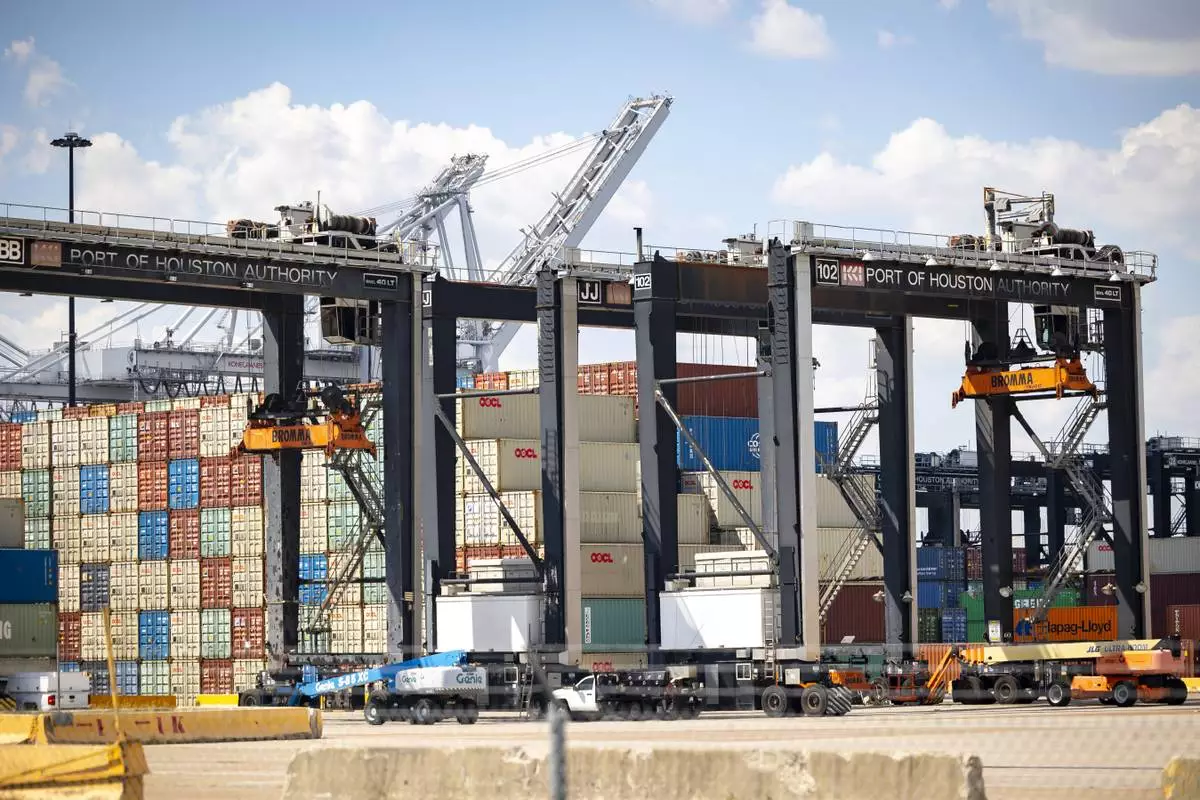
Work is completely stopped at the Barbours Cut Container Terminal during the first day of a dockworkers strike on Tuesday, Oct. 1, 2024, in Houston. (AP Photo/Annie Mulligan)

Longshoremen walk the picket line at the Barbours Cut Container Terminal during the first day of a dockworkers strike on Tuesday, Oct. 1, 2024, in Houston. (AP Photo/Annie Mulligan)
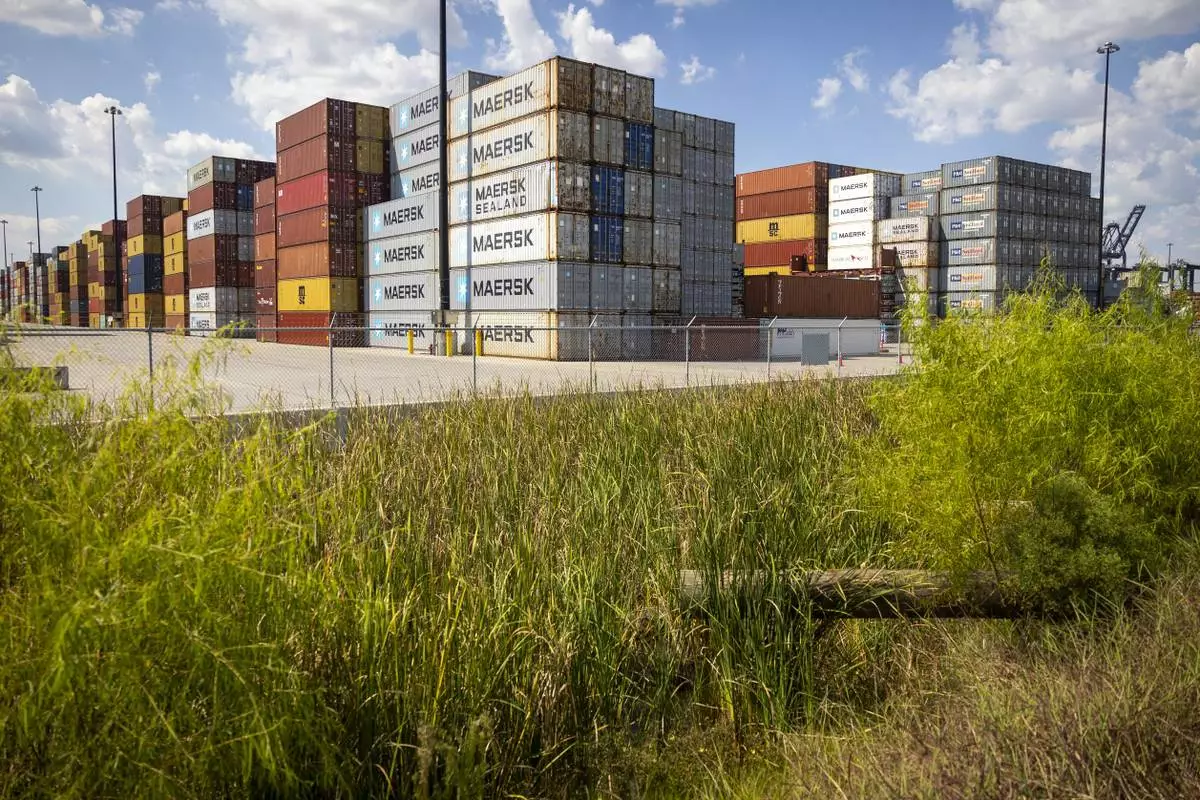
Stacked containers line the Bayport Container Terminal during the first day of a dockworkers strike on Tuesday, Oct. 1, 2024, in Houston. (AP Photo/Annie Mulligan)
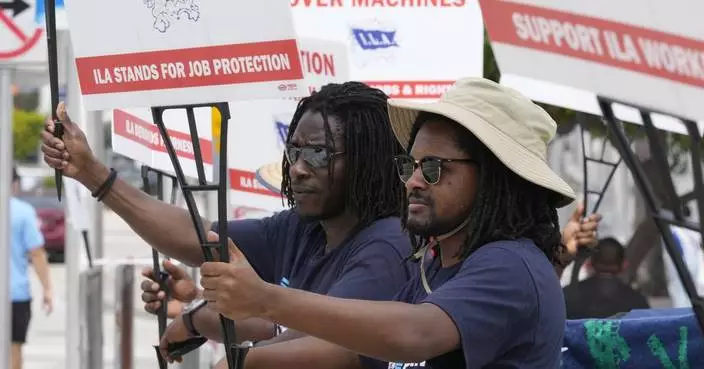
Dockworkers' union suspends strike until Jan. 15 to allow time to negotiate new contract

Dockworkers' union suspends strike until Jan. 15 to allow time to negotiate new contract
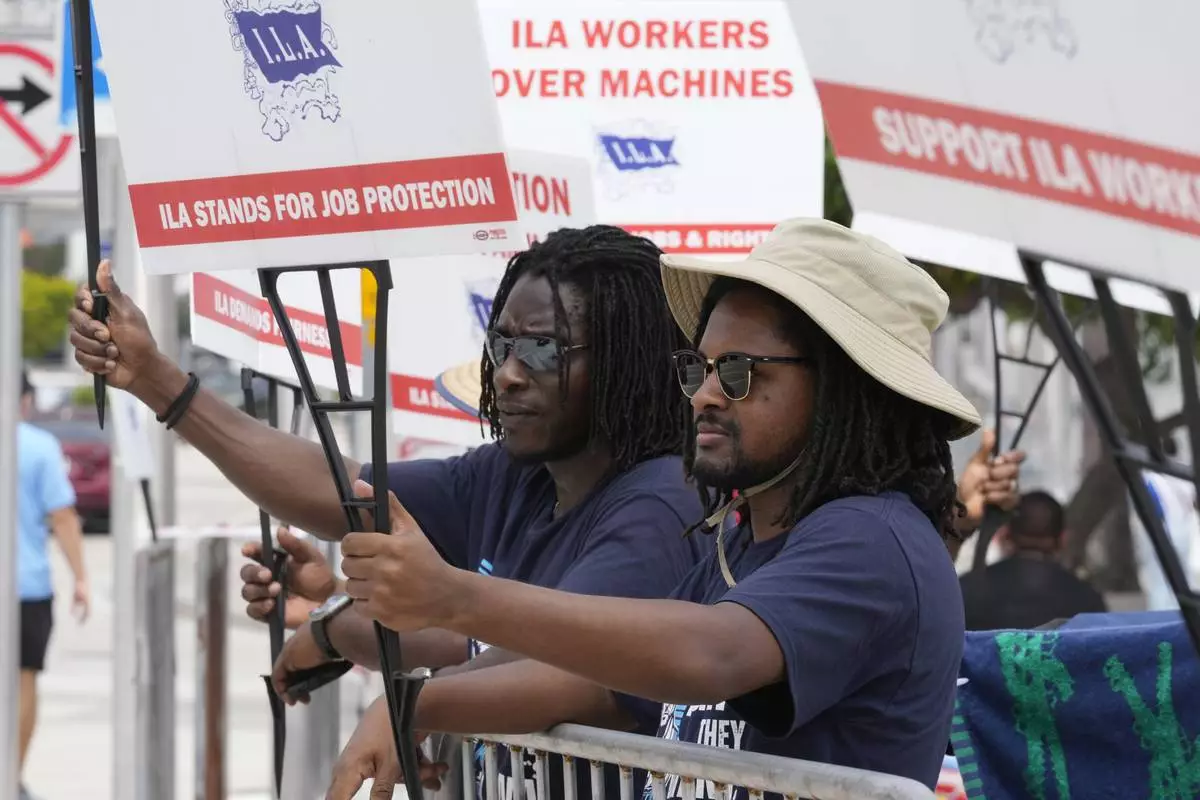
Dockworkers from Port Miami display signs at a picket line, Thursday, Oct. 3, 2024, in Miami. (AP Photo/Marta Lavandier)



